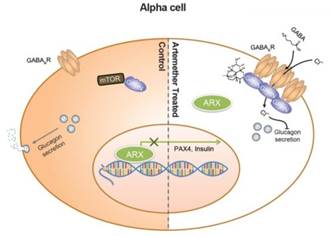
1. Diabetes breakthrough: Malaria drugs |

![]() Scientists all over the globe have been trying to find a way to replace beta cells – also known as islet cells for a long time to fight type 1 diabetes in particular. Researchers have so far attempted to replace destroyed beta cells with new ones using stem cells and adult cells. Although the results have looked encouraging, they are yet to succeed.
Scientists all over the globe have been trying to find a way to replace beta cells – also known as islet cells for a long time to fight type 1 diabetes in particular. Researchers have so far attempted to replace destroyed beta cells with new ones using stem cells and adult cells. Although the results have looked encouraging, they are yet to succeed.
![]() Now, researchers from the CeMM Research Center for Molecular Medicine in Austria seem to have found the missing link, giving hope of a cure for type 1 diabetes. A team of researchers - led by Stefan Kubicek, group leader at CeMM - examined the role of a variety of approved drugs on alpha and beta cell transformation. Their findings were published in the journal Cell.
In addition to beta cells, alpha cells and three other types of cells form the islets of Langerhans in the pancreas, where they are responsible for regulating blood sugar levels.
Now, researchers from the CeMM Research Center for Molecular Medicine in Austria seem to have found the missing link, giving hope of a cure for type 1 diabetes. A team of researchers - led by Stefan Kubicek, group leader at CeMM - examined the role of a variety of approved drugs on alpha and beta cell transformation. Their findings were published in the journal Cell.
In addition to beta cells, alpha cells and three other types of cells form the islets of Langerhans in the pancreas, where they are responsible for regulating blood sugar levels.
![]() In other words, artemisinins - group of drugs commonly used to treat malaria -transformed pancreatic alpha cells into functional, insulin-producing beta-like cells.
"With our study, we could show that artemisinins change the epigenetic program of glucagon-producing alpha cells and induce profound alterations of their biochemical function," explains Kubicek. The way this happens is through the activation of GABA receptors. GABA is a major neurotransmitter produced by islet beta cells. It works as a transmitter within the islet cells, where it regulates the secretion and function of the islet.
In other words, artemisinins - group of drugs commonly used to treat malaria -transformed pancreatic alpha cells into functional, insulin-producing beta-like cells.
"With our study, we could show that artemisinins change the epigenetic program of glucagon-producing alpha cells and induce profound alterations of their biochemical function," explains Kubicek. The way this happens is through the activation of GABA receptors. GABA is a major neurotransmitter produced by islet beta cells. It works as a transmitter within the islet cells, where it regulates the secretion and function of the islet.
![]() Artemisinins reshape alpha cells by binding to a protein called gephyrin. This protein activates the GABA receptors, which are like central switches of the cellular signaling. At the end of a longer chain of biochemical reactions, GABA triggers the production of insulin.
Kubicek's study confirms previous mouse studies that have shown GABA to help transform alpha cells into beta cells. One of these studies is led by Patrick Collombat and is published in the same issue of Cell.
Artemisinins reshape alpha cells by binding to a protein called gephyrin. This protein activates the GABA receptors, which are like central switches of the cellular signaling. At the end of a longer chain of biochemical reactions, GABA triggers the production of insulin.
Kubicek's study confirms previous mouse studies that have shown GABA to help transform alpha cells into beta cells. One of these studies is led by Patrick Collombat and is published in the same issue of Cell.
For enquiries info@jothydev.net.
Please visit: jothydev.net | research.jothydev.com | diabscreenkerala.net | jothydev.com/newsletter
